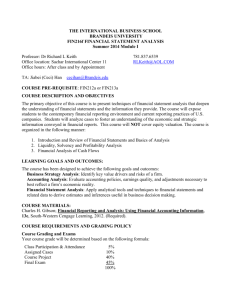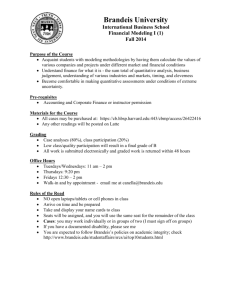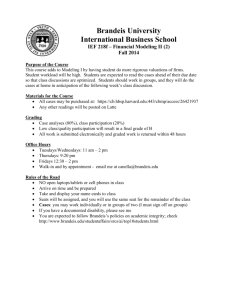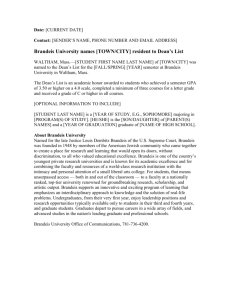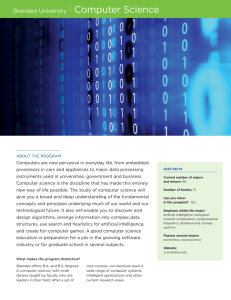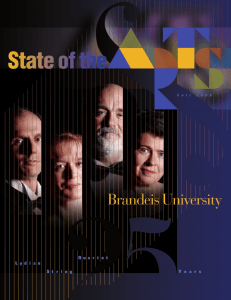Music Brandeis University
advertisement
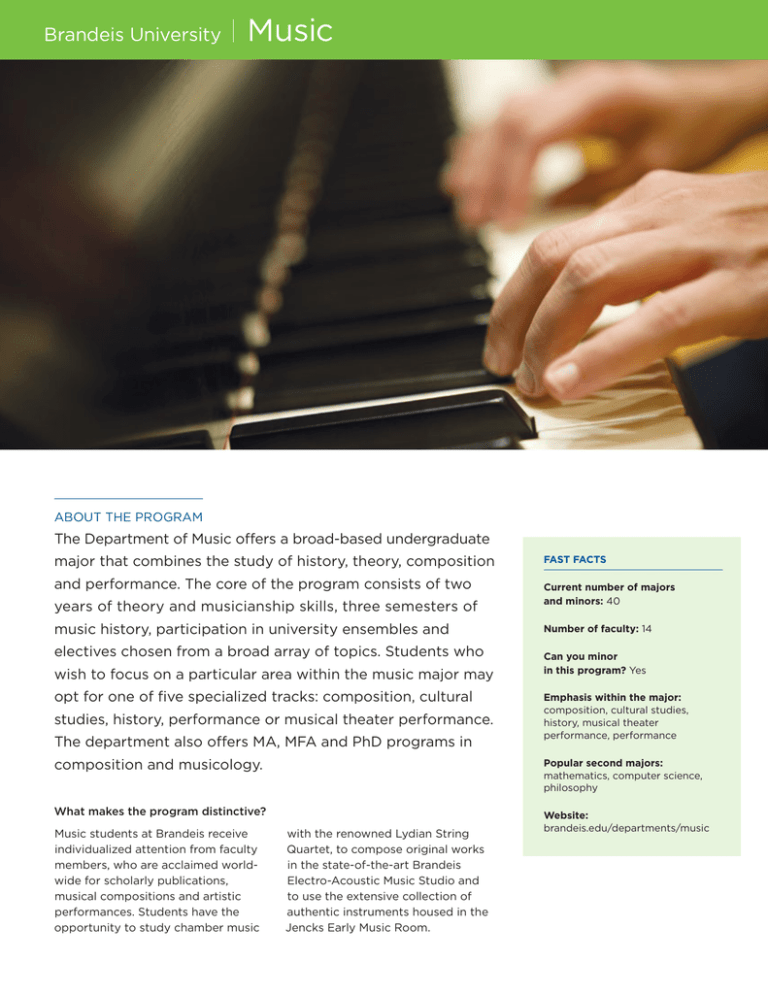
Brandeis University Music about the program The Department of Music offers a broad-based undergraduate major that combines the study of history, theory, composition and performance. The core of the program consists of two years of theory and musicianship skills, three semesters of music history, participation in university ensembles and electives chosen from a broad array of topics. Students who wish to focus on a particular area within the music major may opt for one of five specialized tracks: composition, cultural studies, history, performance or musical theater performance. The department also offers MA, MFA and PhD programs in composition and musicology. Current number of majors and minors: 40 Number of faculty: 14 Can you minor in this program? Yes Emphasis within the major: composition, cultural studies, history, musical theater performance, performance Popular second majors: mathematics, computer science, philosophy What makes the program distinctive? Music students at Brandeis receive individualized attention from faculty members, who are acclaimed worldwide for scholarly publications, musical compositions and artistic performances. Students have the opportunity to study chamber music fast facts with the renowned Lydian String Quartet, to compose original works in the state-of-the-art Brandeis Electro-Acoustic Music Studio and to use the extensive collection of authentic instruments housed in the Jencks Early Music Room. Website: brandeis.edu/departments/music Brandeis University | Music Academics and Research Beyond the Classroom Performance opportunities Students perform in a variety of ensembles, including orchestra, wind ensemble, chorus, chamber choir, jazz ensemble, early music ensemble, small chamber music ensembles, Ghanaian Drumming and Dance Ensemble and Improv Collective. Additional performance opportunities include an annual concerto competition, opera scenes, solo recitals and outreach performances. Performance Music students participate in extracurricular performance ensembles, including the Brandeis Spirit Band, Keyboard Club, Top Score Ensemble, the Undergraduate Theater Collective and a cappella groups. Academic and research opportunities Courses range from medieval to contemporary global. Advanced music majors may take classes alongside graduate students, pursue independent study opportunities with music faculty, or complete a senior thesis, composition or recital as an honors project. Composers are given opportunities to have their work performed by professionals. Special events Each year, music students may participate in the Leonard Bernstein Festival of the Creative Arts, a weeklong showcase of music, art and theater. Students are invited to apply for grants in support of their festival projects. Awards and Recognition Student awards Each year, music students are eligible to receive a variety of awards and grants, including Remis grants for summer study, arts festival grants and numerous departmental awards for outstanding artistic and academic achievement. Leonard Bernstein Fellowship Each year, the music department awards fellowships to select entering instrumentalists based on a supplemental music recording submitted with the Brandeis application. Fellowships provide scholarship funding, free private lessons, chamber ensemble coaching by faculty — including members of the Lydian String Quartet — and recital opportunities. Faculty awards Music faculty members have received distinctions including the Pulitzer Prize, the Guggenheim Fellowship, the Koussevitzky Prize, the Aaron Copland Award, the Charles Ives Fellowship, the Naumburg Award for Excellence in Chamber Music and Grammy nominations. Study abroad Numerous music students elect to spend time abroad. Recent Brandeis music students have studied in Tanzania, Australia, China, Austria, England, Israel and Ireland. Internships Music students have the opportunity to complete internships in a music-related field for academic credit. Rani Schloss ’10, a music and education double major, spent a semester working at WGBH, one of Boston’s all-classical radio stations, digitally editing and cataloging music. World music series MusicUnitesUS, a program that furthers the appreciation of diverse cultures through music, brings artists from across the world to campus. “We believe that music is a common medium that can help us to unite diverse cultures in our own neighborhoods and transcend boundaries in the global community.” Professor Judith Eissenberg, violinist in the Lydian String Quartet and director of MusicUnitesUS After Brandeis Graduate study Brandeis music alumni often pursue master’s and doctoral degrees in performance, composition, musicology, music production and technology, and education. Jacob Friedman ’12 is pursuing a PhD in musicology at Princeton University. Diverse career fields Brandeis music alumni have gone on to become music professors, arts administrators, opera singers, cantors, orchestral musicians, composers, conductors, musical theater directors, TV and record producers, media and digital arts specialists, doctors, attorneys, and elementary and secondary school teachers. Notable alumni Pianist Adam Marks ’00, who has been praised as an “excellent pianist” with “titanic force” by The New York Times, directs the contemporary music group Fifth House Ensemble and teaches at Carthage College in Wisconsin. Nicholas Brown ’10 is a music specialist at the Library of Congress in Washington, D.C. Photo by Ken Schles Office of Communications ©2016 Brandeis University G067

